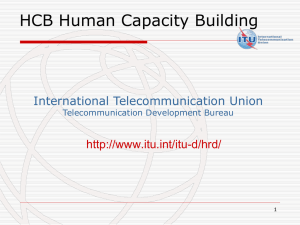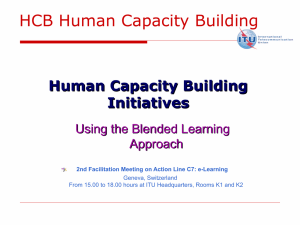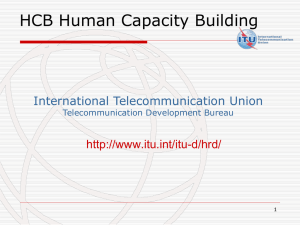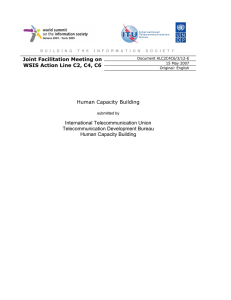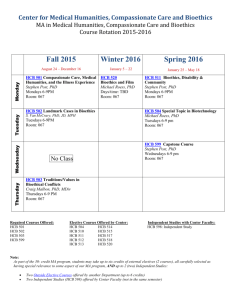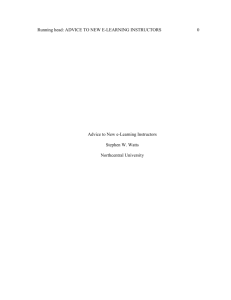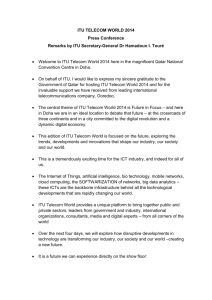blended learning-v6
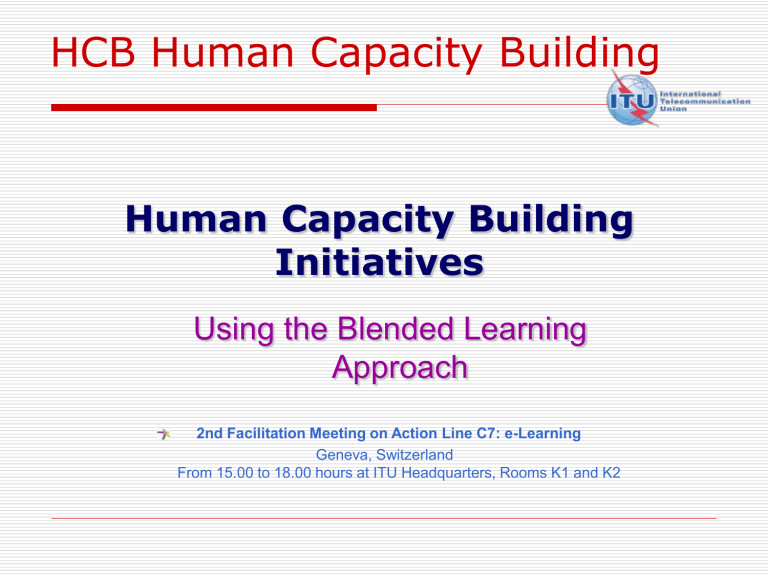
HCB Human Capacity Building
Human Capacity Building
Initiatives
Using the Blended Learning
Approach
2nd Facilitation Meeting on Action Line C7: e-Learning
Geneva, Switzerland
From 15.00 to 18.00 hours at ITU Headquarters, Rooms K1 and K2
HCB Human Capacity Building
What is the Blended Learning Approach
A learning solution that uses a mixture of e-learning and face-toface instructor-led courses
HCB Human Capacity Building
ITU Initiatives or projects using the Blended
Learning Approach
ITU e-Learning Centre
HR e-Communities
Centre of Excellence (CoEs)
Internet Training Centres Initiative (ITCI)
ToT (Tap on Telecom) (TOT) e-Community Learning & Information Centres
HCB Human Capacity Building
DAP
(Doha action plan)
Training Sessions
HRD/M programme 5
Training Agreements
Delivery Mechanism
Networks of Regional and
Local Experts
Face to Face
(Workshops)
ITU eLearning
Platform
Other eLearning Platform
Projects
CoEs
T0T
EC
ITCI
Initiatives e-CLICs
Target Population
Managers and high level professionals from Telecom Sector:
Administrations, Operators, Regulators, etc
Students, Technical Staff, Young entrepreneurs
( focus on women, youth and disabled populations )
HCB Human Capacity Building
The ITU e-Learning Centre
The ITU e-learning platform has been established since 95 as a tool to deliver distance training in developing countries.
This platform has 2 major goals: Promoting the e-Learning culture in the telecommunication sector and to develop training programs.
Each year more than 1000 participants are trained through more than 50 on-line courses in different domains.
The HRD e-learning activities are carried out through different projects and initiatives, collaborating with telecom companies, universities, research institutes and administrations.
HCB Human Capacity Building
The ITU e-Learning Platform Structure
Access Home
Dedicated class-room
Dedicated
Working position
Working position
Players
Instructor Facilitator Tutor
Networks of Regional and local experts
Corporate INTRANET or INTERNET
Participant
Support
Facilities and
Services
Model systems
+data bases
Support
(E-mail, etc)
Training materials
Administration and follow-up
Reference materials
HCB Human Capacity Building
Users
Web-based Application Services PORTAL
Secure Access Learning System
Content Management Virtual Library o o
SIS System
Collaborative Applications
Search Engines
The ITU e-Learning Network Platform , is a set of web-based applications that can be use as a stand alone portal or can be use a feed to multiple site portals .
Through these applications, each portal on the network can have a secure access to administrative
information, online classes, student portfolio, virtual libraries.
HCB Human Capacity Building
Major activities
Online training in 8 major areas: e-Services, Human
Resource Development, Rural connectivity, IP awareness, Spectrum
Management, Regulatory Issues, Technology awareness, Business
Management
Postgraduates programmes:
Strategic Management of Telecommunications online
Telecommunications Technologies online
In partnership with ICU, Korea – scholarships for the Global IT
Technology Program
HCB Human Capacity Building
The ITU e-learning Centre – key figures
Participants by Dom ains e-Services
Human Resources
Rural Connectivity
IP Aw areness
Spectrum Management
Regulatory Issues
Technology Aw areness
Business Management
0 200 400 600 800 1000 year 2006 year 2005
Key Figures for 2006:
Participants: 1200
Training Providers: 35
Beneficiary countries: 60
Beneficiary organizations: 200
Public Digital Library: http://www.itu.int/ITU-D/hrd/elearning/
HCB Human Capacity Building
Creating HR e-Communities
Building a network of HR managers to respond to the evolving HR trend;
Creation of an HR virtual community to discuss common-interest topics;
Strengthening of the HR function of regulatory authorities;
Organization of regional meetings on new trends in the HRM/HRD function;
And development of training evaluation models to identify the training impact in the working environment.
All of the above is conceived with a view to ensuring the continuous strengthening of the human, institutional and organizational capacities of developing countries
.
HCB Human Capacity Building
The ITCI Project, in Partnership with CISCO
ITC Initiative for Developing Countries launched in May 2001 in partnership with
Cisco Systems.
To provide students and professionals in developing countries with affordable training in Internet Protocol (IP) networking.
There are now 66 centres, in 56 countries
More than 3,500 students currently enrolled
More then 4,000 graduates
20 centres have been expanded to include varied curriculum such as cabling, wireless and IT essentials
HCB Human Capacity Building
The ITCI Project, benefits among others…
The students
Train-the-trainers - Two instructors per institution are trained.
The project provides funding for tuition fees, travel, lodging and boarding.
Curriculum - The project provides free access to the curriculum (webbased materials) for self-learning.
Lab equipment - The project provides free of charge one set of lab equipment to each selected institution.
The institute
Provides at least two full time instructors
Provide the required infrastructure
Recruit students and deliver the training to them.
Strong Gender Component
HCB Human Capacity Building
The ITCI Project worldwide
EASTERN EUROPE &
CIS
Academies 12
Graduates: 410
Continuing students: 373
Female percentage: 22.25 %
Active Instructors: 46
Female Instructors: 8
Participants:
Trained : 3500
Training : 4000
Legends
Local Academy-44
Regional Academy-22
Expanded Academy -20
MoC Academy -19
Data as of Sept 2006
LATIN AMERICA and
CARIBBEAN
Academies 9
Graduates: 339
Continuing students: 470
Female percentage: 24.5%
Active Instructors: 41
Female Instructors: 10
ARAB REGION
Academies 7
Graduates: 441
Continuing students: 513
Female percentage: 24.37%
Active Instructors: 26
Female Instructors: 6
ASIA PACIFIC
Academies 21
Graduates: 532
Continuing students: 744
Female percentage: 19.2%
Active Instructors: 53
Female Instructors: 11
AFRICA
Academies 17
Graduates: 1369
Continuing students: 1029
Female percentage: 36.4%
Active Instructors: 65
Female Instructors: 12
HCB Human Capacity Building
EC-ITU Internet Training Centres
A project jointly funded by the EC & ITU to provide skills in open source technologies and promote entrepreneurship.
140-hour course – using a blended learning approach to build skills
Online curriculum developed on “How to build e-Secure Web-
Based Services”
Student Module
Instructor Module
Learning Tracking Utility
HCB Human Capacity Building
ITU-Microsoft Training Centres
Project Rollout May 2005
Zambia
Gambia
Uganda
Rwanda
Ethiopia
Training in Basic ICT skills, providing software, curriculum & training of trainers
HCB Human Capacity Building
TAP ON TELECOM
T echnical
A ssistance
P rogram for developing countries
O bjective:
N ext Generation
Telecom
Networks
Building Economic Prosperity through Knowledge and Innovation
A partnership between IIT, the International Telecommunication
Union and its Centre of Excellence Network, with the support of the Canadian Government
HCB Human Capacity Building
The TAP ON TELECOM hands-on approach
… through remote access to IIT platform
Remote access to IIT’s Montreal Lab for training on Fiber Optics Network, MPLS,
SDH, ATM, IP Cyber Security, as well as Optical Testing, Network Monitoring and
Performance Management
A VPN Gateway (Hosted in a Virtual Machine on the Teacher’s laptop) will be installed to interconnect the classroom Ethernet network setup to the IIT LAB network.
HCB Human Capacity Building
eCLICs
The eCLICs initiative is proposed to provide ICT
Community Learning and Information Centres connected via satellite or other means to the
Internet at rural schools that will also serve as hubs for community development.
“e-exclusion ” - communities in geographically remote areas are being further marginalized and disadvantaged by not having access opportunities.
HCB Human Capacity Building
NEPAD e-Schools Project
ICT for Management
ICT for Education
Health Literacy
ICT Skills
96 schools in Africa involved in the pilot
ITU involved as a partner
Training of Teachers in ICTs
HCB Human Capacity Building
Be a Partner!
Provide Expertise for
any of the listed domains in any/all regions of the world in any language (English, French, Spanish, Russian, Arabic,
Chinese). To participate, lead, contribute to the workshops and CoE activities.
distance learning, web-based curricula, e-learning courseware and tools. To serve as a tutor for any of the online courses that we conduct in the various domains.
Contribute Reference/Training Material for
Online training course/content for the E-learning Platform.
Content in other forms such as providing relevant reference materials.
HCB Human Capacity Building
Hand-In-Glove Partnerships
Building Human Capacities
Opportunities:
Project expansion
Pilot initiatives
New projects
HCB Human Capacity Building
Thank You
ITU/BDT/HCB
